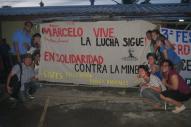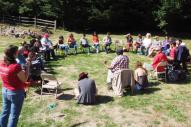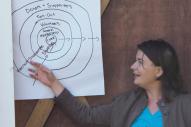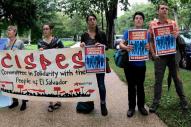Commitment to Dismantling Oppression
What follows is CISPES’ national mission statement on anti-oppression. This statement is part of our national commitment to becoming a more inclusive organization in solidarity not only with the struggle in El Salvador, but with oppressed people everywhere.
CISPES is committed to working for a world without oppression. We recognize that the roots of oppression run deep in our society and in ourselves, and that all freedom struggles — from El Salvador’s battle for self-determination to domestic challenges to racism, sexism and heterosexism — are linked.
CISPES’ commitment to challenging oppressive behaviors springs from a strong desire for community. We seek a community where we can grow and respect each other, and not feel the need to dominate and control other people. Through inclusive organizing, we believe we can achieve community and help build a mass grassroots movement to effectively challenge injustice.
We recognize that barriers to inclusive organizing — racism, sexism, heterosexism, classism, ageism, ableism and other domineering behaviors and attitudes — stem from an ideology of oppression ingrained in our social institutions as well as in each of us.
Oppression is fostered through the ignorance and prejudice that characterize our schools, the media and government institutions. Oppression is enforced through violence, ranging from physical attacks on women –including the forced sterilization of women of color — to assaults on gays and lesbians.
Oppressive behavior can be obvious, such as the beating of Rodney King or the Senate inquisition endured by Anita Hill. Or oppression can be manifested in more subtle ways, as when women’s comments are devalued at CISPES meetings or CISPES fundraising activities are geared toward whites and heterosexuals. This behavior diminishes our collective work, while isolating and disempowering individuals.
Confronting and dealing with oppressive behaviors, then, must be a centerpiece of our work in CISPES. We need to strengthen continuously the mechanisms of inclusive organizing, including affirmative action, educational workshops, and coalition building with movements led by the oppressed. We will continue to study and articulate the history and dynamics of oppression.
We have a responsibility to forge a model of inclusive organizing, within our own organization and within the national and international progressive movements. We must hold ourselves accountable — to educate and to develop ourselves in order to make all of us feel at home in CISPES. Ultimately, we’re striving to create a safe space for the victims of oppression, a space where those who are discriminated against can find allies in the struggle against injustice, and validate their pain, anger and frustration when they are victimized.
Since its foundation, CISPES has acted on a vision of self-determination and social justice. That vision cannot be limited to one country or one people. Solidarity means mutual support in ending discrimination and injustice, while building a society in which everyone can realize their potential without barriers of race, gender, sexual orientation or class.







 "I am a CISPES supporter because continuing to fight for social justice and a more people-centered country means continuing the dream and sacrifice of thousands of my fellow Salvadorans who died for that vision.” - Padre Carlos, New York City
"I am a CISPES supporter because continuing to fight for social justice and a more people-centered country means continuing the dream and sacrifice of thousands of my fellow Salvadorans who died for that vision.” - Padre Carlos, New York City

